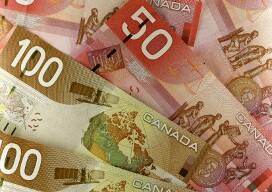The Canadian dollar yesterday as the crisis in Europe escalates, damping demand for commodities and commodity-dependent currencies. The loonie trimmed its losses today on good fundamentals in Canada and the United States.
Talks about Greece leaving the eurozone intensified after the European Central Bank paused lending to some Greek banks. The ECB said it would resume borrowing after the banks boost their capital:
Once the recapitalization process is finalized, and we expect this to be finalized soon, the banks will regain access to standard Eurosystem refinancing operations.
The central bank explained that it does not want to see Greece exiting the currency union, but the bank cannot break the rule to lend only to reliable financial institutions. Anyway, markets reacted negatively to the news. The Stoxx Europe 600 Index fell 0.6. Crude oil, the key export of Canada, declined to the lowest level in six months.
Fundamentals besides the European woes remain positive for the Canadian currency. The United States continue to show signs of recovery and Canada itself is doing well. Canadian manufacturing sales increased 1.9 percent in March, demonstrating the largest advance since September 2011. Many analysts say that Canada’s dollar would be a very strong currency in absence of the European crisis. Unfortunately for the loonie, the crisis in Europe does persist.
USD/CAD fell from 1.0124 to 1.0109 as of 1:47 GMT today after reaching 1.0130 yesterday — the highest level since January 25. CAD/JPY was up from 79.27 to 79.39. EUR/CAD rose from 1.2873 to 1.2886.
If you have any questions, comments or opinions regarding the Canadian Dollar,
feel free to post them using the commentary form below.



Be First to Comment